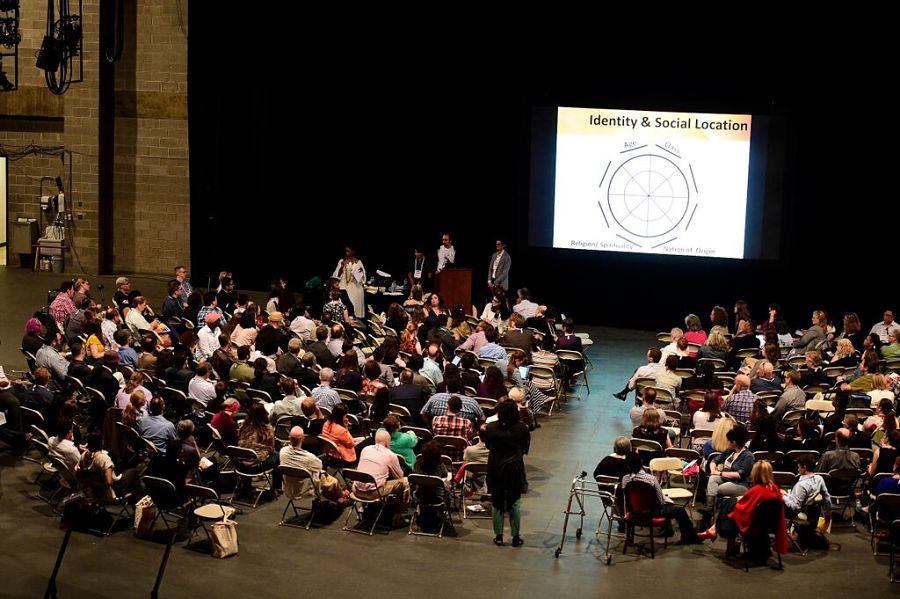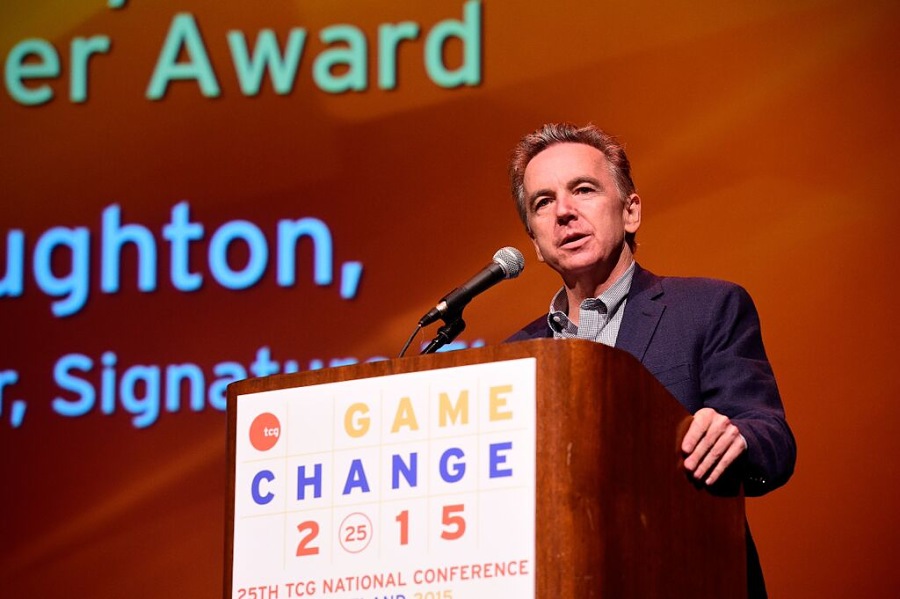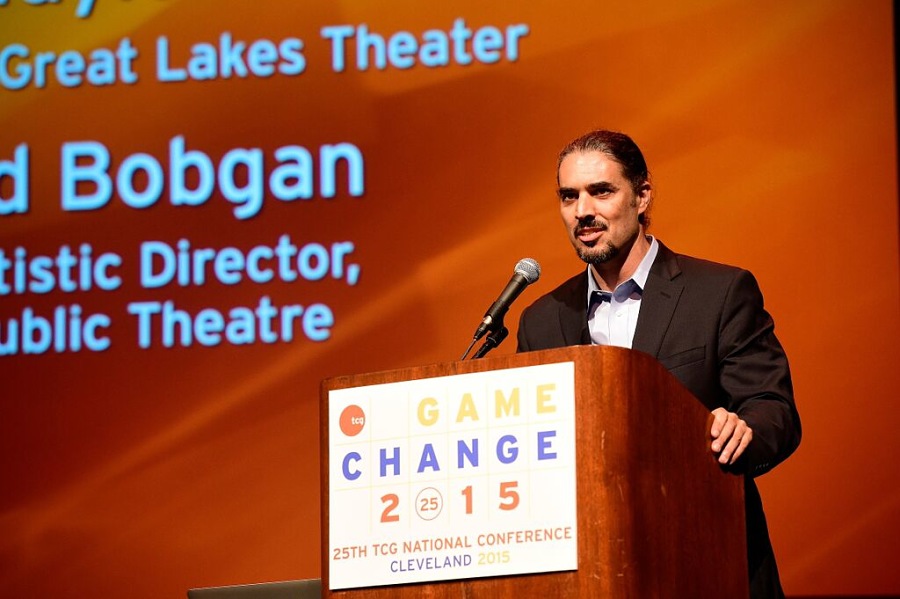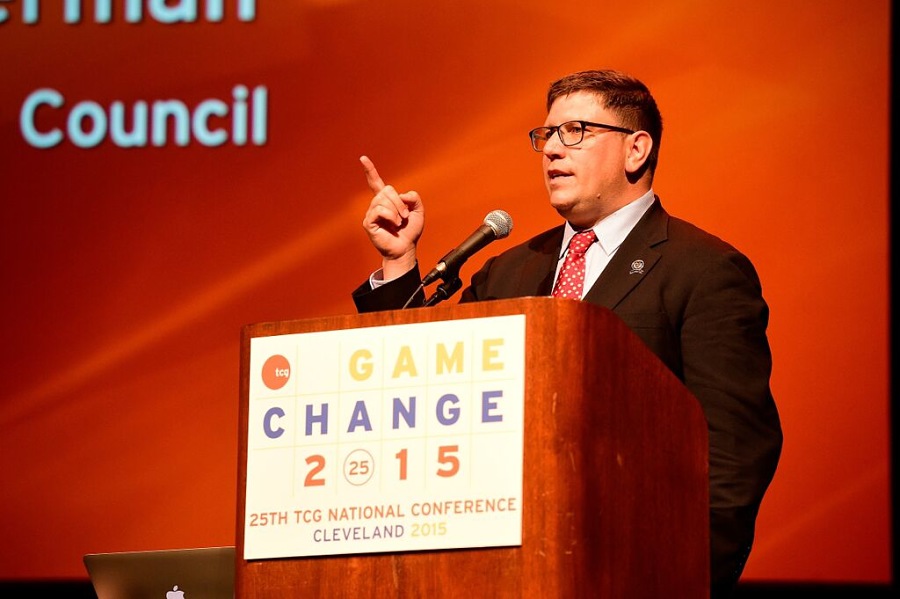CLEVELAND: In the preface to his faux handbook How to Be Black, Baratunde Thurston paraphrases Shakespeare: “Be not afraid of blackness. Some are born black. Some achieve blackness, and others have blackness thrust upon them.” With that mixture of irreverence, probing insight (and an added dose of Bardic influence), it’s no wonder that Thurston was invited to be the main speaker at the opening plenary at Theatre Communications Group’s 2015 National Conference on Thursday.

The conference itself opened with a number of moments like that, with 800 attendees and seven speakers gathering at the Ohio Theatre, connecting through with laughter, hollers, and standing ovations. Titled “Game Change,” this year’s conference is intended to honor pathbreaking theatre leaders and artists of the past and present as well as recognize those of the present and future, said TCG artistic director Teresa Eyring in her opening statement onstage.
“We honor the game-changing leaders who saw the power of pure connection to make, in the words of TCG’s vision statement, a better world for theatre and a better world because of theatre,” she said to the crowd.
The big honoree of the night was Signature Theatre artistic director James Houghton, who accepted TCG’s Visionary Leadership Award for his work in stewarding the playwright’s voice at the theatre he founded in 1991.Houghton recently announced his decision to step down from the Signature’s helm, following a cancer diagnosis, a detail that (although it wasn’t specified during the evening), could be sensed from the emotional testimonials by former Steppenwolf Theatre executive director David Hawkanson and New Federal Theatre‘s producing director Woodie King Jr. as they presented Houghton with the award.

Though he was missing his son’s opening night performance in Anything Goes at AfterWork Theatre in New York, Houghton graciously accepted the prize, remarking: “For me, making theatre, any theatre is a miracle. Truly. We say level up—I don’t know about you guys, but I contend that showing up is leveling up.”
What better place to talk about leveling up than Cleveland, a town that’s gone through its own leveling up in the past few years, with the $60 million restoring of the PlayhouseSquare complex downtown and the revitalization of the Detroit Shore neighborhood on the west side—efforts that were led in large part by the town’s theatre artists.
“I imagine that some of you are still thinking…Really? Cleveland?” said Cleveland Public Theatre artistic director Raymond Bobgan to the TCG conference crowd, who confessed that was his initial impression when he moved here two decades ago. Yet standing in the Ohio, a 1920s-era theatre that seats 1,000, in a district that contains nine performance spaces and more than 300 crystal chandeliers, the question easily morphed from “Why Cleveland? to “Why not Cleveland?”

“What I found here was an incredible community, a community that values kindness and has a strange, deep sense of civic pride, but also civic participation,” said Bobgan. “A city that has played such an important role in the history of our country in so many areas, but especially in the area of diversity. But what I also found is that here artists are really celebrated.”
Pride in its theatres is what has allowed the art form to flourish, something that Bob Taylor, executive director of Great Lakes Theater, passionately pointed out in his remarks, where the city has fostered long-lasting institutional houses, including the 100-year-old Cleveland Play House, and still has room for the creation of sprightly ensembles like the “five-years-young” Theatre Ninjas.
“Thank you for being a force for good and light and love in a nation that’s desperate for good and light and love,” said Cleveland city councilman Joe Cimperman to the crowd. In a frank and heartfelt speech—which Cimperman admitted are rare for him in his political career—he recalled how, as a young boy whose grades were failing and whose bipolar mother was in the hospital, it was in the theatre where he found a sense of community. (For the record: He played Cheswick in a school production of One Flew Over the Cuckoo’s Nest.) “You guys are the ones who helped people like me that you never knew you helped, but without you, we would not be here.”

The councilman also pointed out that theatremakers are advocates of truth, allowing the public to look deeply and acknowledge the failures of the past, all the better to move forward into the future. “Thank you for being so relevant in this time of discord in our nation.” The crowd murmured their approval. Though no one mentioned the incident by name during the plenary, attendees clearly felt the callout to the horrifying news from the previous night in Charleston, S.C., in which a young white man shot nine black churchgoers in cold blood.
One recent racial controversy was mentioned by name, though: Rachel Dolezal, the white Northwesterner and formed NAACP leader who identifies as black, an irresistible target for Thurston, who won his tongue-in-cheek “Lifetime Achievement Award for Performance.” During his alternatively hilarious and incisive presentation, the comic recalled the experience of growing up with a pro-Afrikan mother in the ’80s in Washington, D.C. “The very first book I can remember reading as a child is this,” he said, the slideshow behind him changing to a book cover of This is Apartheid, a pictorial introduction. The image was met with a mixture of shocked laughter and groans. “That will fuck you up a little bit.”
Thurston positioned his comedy, both in the form his bestselling book How to Be Black as well as his work in technology, as a kind of performance art by digital means. He then shared slides from among more than 4,000 photos that have been shared on Instagram with the hashtag #howtobeblack, featuring people of all races posing with the stark and simple book cover. “It doesn’t matter if you’re black or not, it is ridiculous to hold a book How to Be Black,” Thurston said.
The slide behind Thurston then changed to show a picture of Dolezal holding the book. Dolezal’s imaginative transracial identification, Thurston quipped, inspired him to think outside of some other boxes: The next slide read “I identify as billionaire. #transwealthy.”
The Instagram hashtag was only one example of how Thurston’s book has inspired its own kind of performance art. The comic also recalled how, while writing the book, he had “office hours” in which Internet users could watch him write the book live via Join.Me—an exercise that recalls Suzan-Lori Parks’s “Watch Me Work” project. One difference, though, is that viewers could message him suggestions and comments. His favorite, shared on a slide: “My girlfriend is Chinese and I’m half Jamaican / half regular-black. I think our kids might end up Dominican or something.”
He closed with words more tailored to the moment. “I have a strong belief that the distinction between those onstage and offstage, between those who get to choose what goes onstage and what’s onstage is breaking down,” he said. “I think it’s very important for us, in the interactive world, whether that’s physically or technologically, to shift that power a little bit to be a lot more inclusive.”
Like Cimperman with One Flew Over a Cuckoo’s Nest, Thurston conjured a world in which performance can change us and make the impossible possible—and where even talking about race won’t be as awkward or as fraught as it is now. He closed his speech with the line: “If there’s one last thing that I have learned from our future is that it’s wonderful. And we’re all Dominican.”


